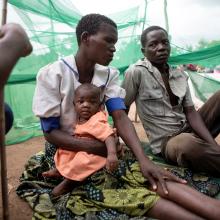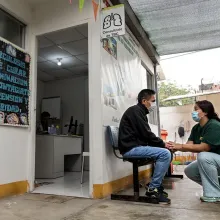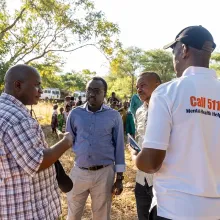“There are all kinds of moral practices in the world, and facing directly the suffering of the poorest, feeling deeply the injustice that have led them to this situation, I think you kind of always have to test yourself to see, okay, have I really become so used to this that my soul isn’t capable of being fractured anymore?” - Partners In Health co-founder Dr. Jim Kim
In this election, I want to elect leaders who souls are capable of being fractured by what is happening beyond Canada’s borders. These leaders would understand we cannot cut Canada’s foreign aid budget – hopefully not in the future, but certainly not now.
I want leaders who can hold that both of the following positions are true: One, the threats to Canada’s sovereignty and economic livelihood from reckless actions of the Trump administration are serious and should be our top priority. We will need to transform our economy and build in robust supports for those most affected. Two, on an objective list of countries most damaged so far by chaos from south of the border, Canada wouldn’t make the top ten.
The existential crisis for people living in countries higher on our imaginary list – places like Somalia, South Sudan, Malawi, Liberia and Haiti to name just a few – is how many of their friends, families, and neighbours literally won’t survive their poverty or lack of access to health care in coming days and weeks.
The number of lives that could be lost due to the U.S. government’s recent elimination of more than 5,200 USAID and other international assistance programs, worth tens of billions of dollars, is conservatively estimated at more than two million in the first year alone. Tens of thousands of HIV and tuberculosis patients woke up this morning without access to previously available therapies. Children who were being kept alive through ready-to-use therapeutic food programs are wasting away or have already died. Pregnant mothers don’t have a safe place to deliver because staff have been laid off and the health center is closed.
These realities need to be made explicit in debates around Canada’s global health and foreign aid commitments. Our leaders need to hear from Canadians that people’s lives are more than fine print, and that our own credibility as a responsible actor depends on our ability to read the ransacked global room. Canada had several months to prepare for U.S. economic aggression. Global south countries and the most vulnerable people within them had no warning of the cruelty they are being subjected to through the decimation of USAID.
Canada’s aid sector has responded to the crisis with an ‘Aid Works’ campaign highlighting the myriad economic, health, and political benefits our international assistance brings back to Canada, in addition to its positive impacts on millions of lives. At the same time, those of us who have the privilege of working in this space need to better explain the real-life implications of extreme scarcity in places where our aid dollars are invested, and what it takes to achieve long-term change. This requires a deep humility and respect for the leadership and expertise of those we too often consider as statistics.
One example: During a meeting at the Canadian embassy in Port-au-Prince a few years after the 2010 Haiti earthquake, a senior Canadian aid official suggested that better directions and signage to health centers might help drive demand for health services among Haitians living in remote areas. My Haitian colleagues kindly responded that people knew all too well the location of their nearest health center. They also knew that if they made the journey, there would likely be no doctor or nurse to receive them, few medications in the pharmacy, and little evidence of dignified, effective, or affordable health care. Given the circumstances, it made good sense for a sick person to pass on a four-hour walk in the blazing sun.
The moral? If we support governments and communities to improve their health systems, health-seeking behaviour will follow. Weak health systems are also the best vectors for the next pandemic; we ignore them at our peril.
Also often left unsaid is the fact that Africa, for example, is a net creditor to the global north due to onerous debt repayment terms, foreign company tax evasion, resource extraction, unequal labour flows, and illicit financial flows. These factors explain why the budget of an average-sized Canadian hospital can be larger than the health budget of a small African country.
Objections to aid spending are not new: Money is wasted, we need to increase defense spending, we need to care of our own first. Alternatively, we might say we need to avoid sounding like current decision makers in the country that started this crisis.
Here are the facts: Aid makes up less than four-tenths of one percent of our budget. At least eight OECD countries spend more on both defense and aid as a percentage of GDP/GNI than Canada. Project reporting for Global Affairs Canada funding is onerous, audits are rigorous, and suggestions of rampant fraud are unsupported by facts.
We know all too well where the Trump administration stands. Now it’s our values that are being tested. This is no time to turn away from others in need, for their sake and for ours.
- Mark Brender is PIH Canada’s National Director



